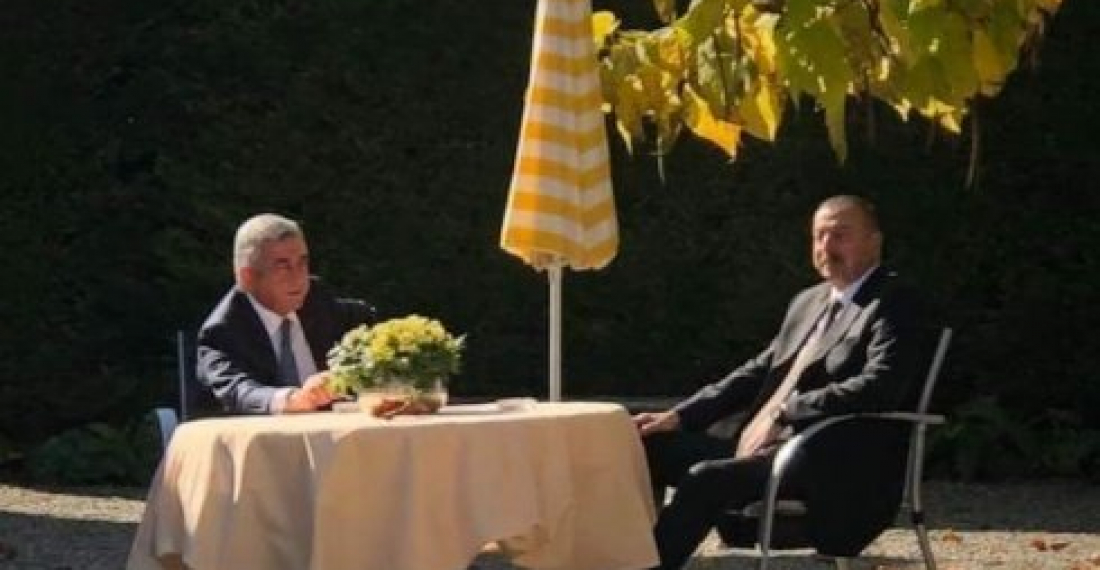On Karabakh, neither the domestic situation in Armenia and Azerbaijan, nor the regional and international context, is favorable for any breakthrough, argues Benyamin Poghosyan in this op-ed
On April 11 the incumbent President of Azerbaijan lham Aliyev was re-elected for his fourth term in office. Despite a boycott by the Azerbaijani opposition, as well as a tough assessment on elections from western observers, very few doubt that Aliyev will continue to rule in Azerbaijan. On April 9, Armenia finalized its transformation from semi-presidential system of government to a parliamentary one. The Parliament elected a new President - former Armenian ambassador in the UK Armen Sarkissian. His role defined by the new constitution is purely ceremonial. On April 17, Parliament will elect a new Prime Minister who will assume much of the President's powers. The ruling Republican Party endorsed the candidacy of former President Serzh Sargsyan for the Prime Minister position. Republicans have a majority in the Parliament, which effectively precludes any possible surprise during the April 17 vote. Thus, barring some major unpredictable developments, the same persons will continue to keep the reins of power, both in Armenia and Azerbaijan.
Given the lack of any substantial movement in the Karabakh negotiation process since the April 2016 four-day war, experts dealing with regional security dynamics in the South Caucasus are wondering if negotiations could be reinvigorated after the elections. However, neither the domestic situation in the two countries, nor the regional and international context is favorable for any breakthrough. Both Armenian and Azerbaijani societies are still absorbing the results of the four-day war. In Azerbaijan, society mainly perceives April 2016 as a victory, and as a proof that any changes on the ground can be achieved only through military means. The widespread notion is that the Azerbaijani army in four days achieved more than Azerbaijani diplomacy had during 22 years of negotiations. The multiple statements by the Azerbaijani political leadership describing April 2016 as glorious days for Azerbaijan, which gave a good lesson to Armenia, only strengthens the belligerent mood in Azerbaijan.
As for Armenia, the 2016 April War has significantly diminished the readiness of Armenian society to accept solutions based on the idea of immediately withdrawing from parts of the security zone, simultaneously postponing the referendum on the final status of Karabakh. The vague reaction of the international community, and in particular Armenia's ally Russia, to the April events, created doubts regarding the viability of any international security guarantees to be provided to Karabakh till the organization of a new referendum. Thus, the absolute majority of Armenian society strongly believes that in the current situation any changes to the status quo, which will not lead to the immediate recognition of Nagorno Karabakh independence by both Azerbaijan and international community, will only usher in a new war.
The regional and international context also does not bode well for any advancement in negotiations. The attention of the main players is focused on the Middle East, in particular on Syria, where the US, UK and France latest strikes against President Assad forces has deepened the strategic disagreements between Russia and the West. The use of veto power in the UN Security Council by both Russia and the Western powers only widened the gap between the two sides. Syria is actively being transformed into a proxy war battlefield, where Russian, American Iranian, Turkish, Israeli, Gulf Powers and European interests are intertwined in complicated nexus of agreements and disagreements. The looming May 12 deadline for President Trump to either extend the waiver on nuclear related Iranian sanctions or bring the Iran deal to the brink of collapse, only adds uncertainty in the region.
Another pattern of regional security dynamics is Turkey's policy of deepening relations with Russia, simultaneously keeping a door open with the US. Turkey managed to receive Russia's tacit support for its incursions into North West Syria, and de facto controlling large swathes of territory. Turkey's statements that it will hand over control over those territories to the population after elections in reality means the presence of Turkey in parts of Northern Syria is there to stay for the foreseeable future. Meanwhile, Turkey is continuing its active contacts with the US seeking to get US for further incursion towards North East Syria, which currently is under the control of US backed Syrian Democratic Forces comprised mostly of Kurdish YPG group. The evolving Russia - Turkey - Iran alliance in Syria may in the short term alleviate the disagreements between parties. However, as Turkey's endorsement of the April 14 US, UK and France joints strikes in Syria have shown, currently this is mostly a tactical alliance and lacks a strategic vision.
The growing tensions in the Middle East simply remove the South Caucasus from the foreign policy agenda of regional and global actors. In these circumstances, neither Russia, nor the US, Turkey and Iran are ready to allocate the necessary time and resources to move the Karabakh negotiations forward. Yet, given the possibility of regional spillover in case of resumption of wide scale hostilities, it's hard to believe that anyone is interested in a new Karabakh war. Thus, the most likely scenario for coming year or two will be a continuation of the efforts to manage the conflict and keep the current status quo, while continuing the diplomatic activity of Minsk group co-chairs to secure the enlargement of OSCE monitoring mission and deploy ceasefire violations investigative mechanisms.
source: Dr. Benyamin Poghosyan is the Executive Director of the Political Science Association of Armenia. He contributed this op-ed to commonspace.eu
The views expressed in opinion pieces and commentaries do not necessarily reflect the position of commonspace.eu or its partners






